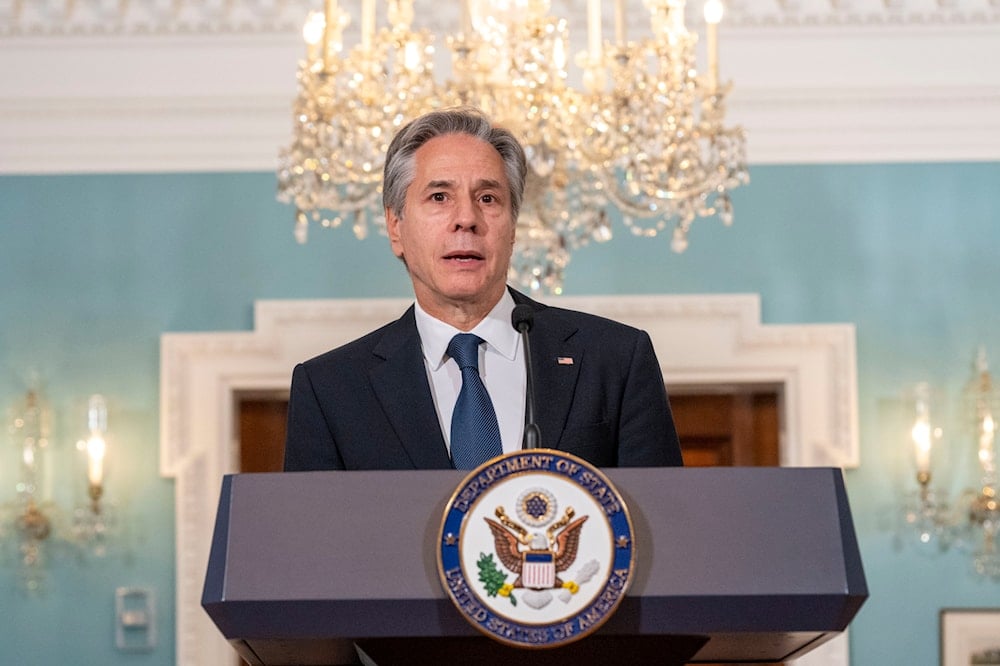US, South Korea, Japan plan response to DPRK's ICBM test: Blinken
The US, South Korea, and Japan are coordinating a response to the DPRK's recent intercontinental ballistic missile test, underscoring regional security concerns and escalating diplomatic efforts.
-

Secretary of State Antony Blinken speaks during an event with Secretary of Commerce Gina Raimondo on the Economic Benefits of US Travel and Tourism on October 29, 2024. (AP)
In a joint statement on Thursday, US Secretary of State Antony Blinken announced that the US, South Korea, and Japan are preparing coordinated actions in response to the DPRK's recent intercontinental ballistic missile (ICBM) test.
This comes after the DPRK announced it test-fired one of its newest and most powerful missiles for the first time, the Hwasong-18. The Korean Central News Agency (KCNA) cited Kim Jong Un defending the country's military drills and development, saying it is "an appropriate military action that fully meets the purpose of informing the rivals... of our counteraction will." Kim further asserted that the DPRK will continue enhancing its strategic missile capabilities and "will never change its line of bolstering up its nuclear forces."
The launch, confirmed earlier by Japanese Defense Minister Gen Nakatani, saw the ICBM travel approximately 1,000 kilometers at an altitude exceeding 7,000 kilometers before landing in the Sea of Japan, roughly 200 kilometers west of Okushiri Island and outside Japan's exclusive economic zone.
During a press conference with US Secretary of Defense Lloyd Austin, South Korean Foreign Minister Cho Tae-yul, and South Korean Defense Minister Kim Yong-hyun, Blinken underscored the importance of the trilateral alliance in addressing regional security threats.
"We are closely consulting with our partners and also with Japan," Blinken stated. "Foreign Minister Cho and I spoke with our Japanese counterpart early this morning, and we will be focusing, as always, on actions we will take in response to North Korea's missile test."
WATCH LIVE: Blinken, Austin hold briefing with S. Korean counterparts as N. Korea tests missile https://t.co/H30pqvOmfW
— PBS News (@NewsHour) October 31, 2024
For years, the US, South Korea, and Japan have conducted joint military drills on and around the Korean Peninsula, a strategy they claim is aimed at reinforcing regional defense but one that has also provoked sharp reactions from the DPRK.
The DPRK has constantly affirmed that it views these exercises as direct threats, often responding with escalatory measures, including missile tests and military demonstrations, which it deems necessary for its defense.
No evidence yet of DPRK troops involved in combat against Ukraine forces
Elsewhere in his remarks, Blinken stated that while there is currently no evidence of DPRK troops being deployed in combat against Ukrainian forces, Washington anticipates this may occur shortly.
"We now assess that there are some 10,000 North Korean soldiers in total in Russia, and the most recent information indicates that as many as 8,000 of those North Korean forces have been deployed to the Kursk Region. We've not yet seen these troops deploy into combat against Ukrainian forces, but we would expect that to happen in the coming days," Blinken said when asked to comment on NATO head Mark Rutte's statement on Monday, that DPRK troops have reportedly been deployed to Russia's Kursk Region.
Read more: Kim Jong Un calls South Korea an 'unchangeable enemy'
The DPRK's recently signed strategic partnership with Russia has sparked allegations that North Korean troops are participating in efforts to support Russia in its special military operation against Ukraine.
The Russian Foreign Ministry responded to these claims, asserting that cooperation between Russia and DPRK is in line with international law and not directed against South Korea's security interests.
"Cooperation between the Russian Federation and North Korea is carried out within the framework of international law and is not directed against the security interests of the Republic of Korea," a spokesperson of the Russian Foreign Ministry said.
In June, South Korea decided to consider the possibility of arming Ukraine following the signing of the Russian-DPRK defense treaty.

 4 Min Read
4 Min Read








